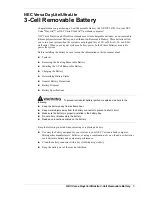
Glossary
This glossary includes terms and
definitions from the
IBM Dictionary of
Computing
(New York: McGraw-Hill,
1994).
ac. Alternating current.
ac power. Power that is supplied to the
computer through an electrical outlet.
ANSI. American National Standards
Institute.
application program. A program that
performs specific tasks on your
computer, such as word processing or
creating spreadsheets.
Advanced Power Management (APM).
A facility consisting of one or more layers
of software that support power
management in computers with power
manageable hardware. The APM
software interface allows applications,
operating systems, device drivers, and
the APM BIOS to work together to
reduce power consumption, without
reducing system performance.
ASCII. American National Standard
Code for Information Interchange.
ATA PC Card. A PC Card with an AT
attachment hard disk drive interface such
as a storage device PC Card.
AUTOEXEC.BAT. A file that contains a
startup procedure of DOS. Each time
you start your system, DOS performs the
commands that are stored in this file.
backup copy. A copy, usually of a file
or group of files, that is kept in case the
original file or files are unintentionally
changed or destroyed.
batch. A process method in which a
program or programs records with little or
no operator action.
BIOS (Basic Input/Output System).
Microcode that contains such basic
hardware operations as interactions with
diskette drives, hard disk drives, and the
keyboard.
bitmap graphics. (1) A form of graphics
in which all points on the display are
directly addressable. (2) In multimedia
applications, a form of graphics in an
area of computer memory or storage that
can be displayed as an image.
boot. To prepare a computer system for
operation by loading an operating
system.
bps. Bits per second. In serial
transmission, the instantaneous bit speed
with which a device or channel transmits
a character.
bus. A facility for transferring data
between several devices located between
two end points, only one device being
able to transmit at a given moment.
cache memory. A special memory,
smaller and faster than main memory,
that is used to hold a copy of instructions
and data in main memory that are likely
to be needed next by the processor, and
that have been obtained automatically
from main memory.
combination keys. Keys that have
specific functions when you hold them
down at the same time.
configuration. (1) The manner in which
the hardware and software of an
information processing system are
organized and interconnected. (2) The
physical and logical arrangement of
devices and programs that make up a
data processing system. (3) The devices
and programs that make up a system,
subsystem, or network.
CONFIG.SYS. A file that contains a
group of commands to load installable
device drivers and reserve space in
system memory for information
processing. This file is referred to by
DOS during system startup.
CRT. Cathode ray tube display.
device driver. A file that contains the
code needed to attach and use a device.
Operating system loads device drivers for
screens, keyboards, printers, diskette
drives, hard disk drives, and auxiliary
devices. The user can replace these or
add other devices by coding and loading
a device driver.
DIMM. Dual inline memory module.
Copyright IBM Corp. 1995
269
All manuals and user guides at all-guides.com












































